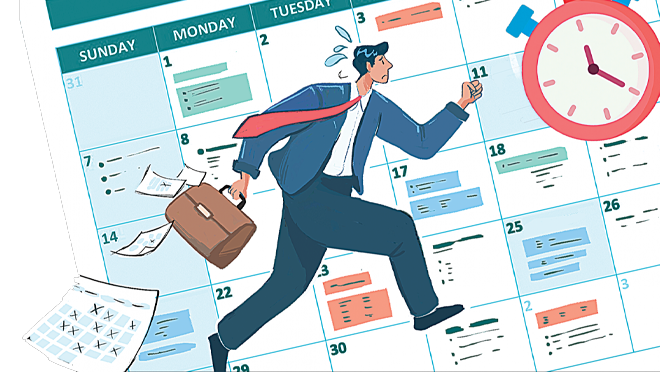Why your calendar needs breathing space
Why your calendar needs breathing space

Imagine this: You have just finished a 45-minute meeting that was originally scheduled for a crisp 30 minutes.
As you gather your laptop and materials, you rush out of the conference room, vaguely nodding at a colleague in the busy hallway who may have greeted you with a polite “hello”— or perhaps it was a casual “goodbye”. With your coffee in hand, you dive into the next call, hardly taking a moment to breathe.
Five minutes into the discussion, you suddenly realise that your mind is still following up on an email from the previous meeting or preparing a response in your mind to a bizarre comment you could not address at that time.
Frustration begins to creep in as you find yourself smiling at the wrong stakeholder during the call — someone who has just asked you a critical question, and everyone in the meeting is looking at you, waiting for your reaction.
Welcome to the chaotic “corporate cardio” world, where meetings stack up like an unending treadmill, and the frantic pace has become the new normal. Each day feels like a dizzying marathon, leaving you scrambling to keep up, often at the expense of meaningful engagement and clear communication.
While most modern professionals have become accustomed to accepting back-to-back meeting invites as if they were booking seats on a Biman flight before Eid, we rarely pause to ask: Is this sustainable? Productive? Sane?
The answer is a resounding no. The truth is, this relentless pace is not just unsustainable, it is detrimental to our well-being and productivity.
Let us break it down.
First, your brain is not Netflix; it does not auto-play the next episode. Jumping from one intense discussion to another without a break means not processing, reflecting, or retaining information. A 10 to 15-minute buffer is like a breath of fresh air, a moment of relief in the midst of chaos, helping you reset, note key takeaways, and prepare for what is next.
Second, have you ever waited for someone who is just wrapping up another call? That delay cascades across teams, affects decisions, and sends carefully crafted agendas into the digital trash. One person’s poor scheduling often turns into everyone else’s lost time.
Lastly, Zoom fatigue is real. The moment you realise you have been nodding with your mic off for 47 minutes and no one noticed — because everyone else is equally zoned out — should tell you something. Breaks reduce fatigue and increase genuine contributions.
Bangladesh’s fast-paced workplaces often reward responsiveness and immediate availability. However, being “available” does not necessarily mean being “efficient.”
Declining or rescheduling a meeting to accommodate a 10-minute buffer is not rude; it is a powerful act of self-respect. It is a statement that your time and well-being matter. As a bonus, you might find time to drink water or (gasp!) go to the bathroom like a real human.
How can you introduce buffers without seeming demanding?
Most platforms allow you to set your default meetings to end 5–10 minutes early. For instance, you can set your default meeting duration to 25 minutes instead of 30, or 50 minutes instead of an hour. This way, you can ensure that you have a few minutes to gather your thoughts and prepare for the next meeting.
Use “tentative” or “maybe” smartly. Do not blindly accept the next meeting if your calendar has a spill-over event. It is not a wedding invitation. Check your availability first.
Finally, encourage a ‘buffer culture.’ This means that managers and team leads should model this behaviour and inspire their teams to do the same. A culture that respects buffer time values everyone’s productivity and well-being.
It is about creating an environment where it is okay to decline or reschedule a meeting to accommodate a buffer, and where everyone understands the importance of taking breaks to maintain productivity.
Being busy is not a badge of honour if it means showing up half-prepared, mentally drained, and chronically late.
So next time someone sends you a meeting request that overlaps with another, remember: your time is valuable. Pause. Check. In today’s workplace, the real power move is not attending every meeting; it is attending the right ones, with the right energy, ensuring the right outcome.


